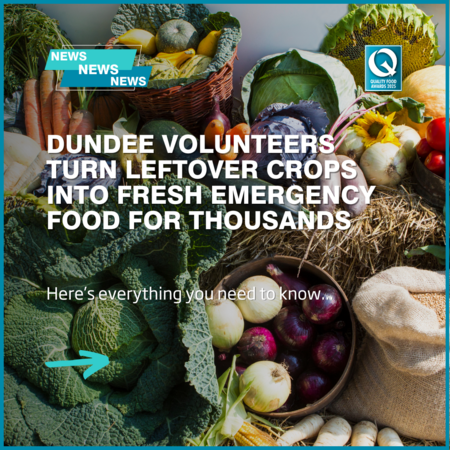
Dundee volunteers turn leftover crops into fresh emergency food for thousands
Launched in 2023, Transition Dundee’s volunteer‑led Gleaning Project harvests edible produce left after commercial pickers finish and redistributes hundreds of kilograms of fruit and vegetables each week to local larders, community fridges and food banks amid Scotland’s wider food‑waste challenge.
Scotland wastes more than a million tonnes of food and drink a year while thousands of people go hungry — a paradox that Transition Dundee’s Gleaning Project has set out to tackle by turning fields into emergency food stores. Launched in the summer of 2023, the volunteer‑led initiative harvests edible produce left after commercial pickers have finished and redistributes it to community projects across the city. According to the original report, the rescued fruit and vegetables are channelled into local larders, community fridges and food banks so that fresh, perishable produce reaches people who would otherwise have limited access to it.
Government figures show that over one million tonnes of food and drink were wasted in Scotland in 2021 and the Scottish Government has framed food waste reduction as part of its wider circular‑economy and sustainable development commitments, including delivery of UN targets on food loss and waste. At the same time, local need is acute: the project’s co‑ordinator notes that roughly 5% of Dundee’s population experience food insecurity, a gap the gleaning days aim to help close.
The Gleaning Project operates by arranging volunteer days on growers’ land after a commercial harvest. Volunteers pick edible, unsold or out‑graded produce and hand it to redistribution partners rather than letting it rot in fields or be sent to landfill. “We distribute the produce through the Dundee Community Food Network,” Alex Daniels, Transition Dundee’s gleaning co‑ordinator, told The Courier, describing how the organisation links directly into the city’s existing food‑support infrastructure. The Dundee Community Food Network itself coordinates more than thirty community food projects and acts as the local hub for moving surplus to where it is needed.
Because gleaning follows the agricultural calendar, activity is seasonal. Daniels described the busiest periods as spring (roughly April to June) and the late summer berry harvests in August and September. Yields vary but can be substantial: on one cauliflower gleaning day the team recovered 600 kg; on its biggest day the group picked just over a tonne of cauliflowers and pumpkins; and on another occasion volunteers gathered some 300 kg of blueberries. When a large haul is secured, the produce has been distributed beyond Dundee to nearby towns such as Perth, Cupar and Arbroath.
The reasons so much food is left in fields are systemic rather than accidental. Growers face market‑driven cosmetic standards, weight and size specifications for produce sold by unit, high labour costs that make repeated picking uneconomic, and a tendency to overplant to hedge against crop failure — all of which can leave perfectly edible food untaken. These drivers are widely documented by community gleaning networks and by Transition Dundee itself, which notes that even relatively small recoveries make a meaningful contribution to local food supplies.
Convincing farmers and landowners to open fields to volunteers has not been straightforward. Daniels acknowledged initial scepticism, saying there are “a lot of issues for landowners in terms of letting people onto their land.” Transition Dundee stresses that it addresses those concerns directly: its guidance covers health‑and‑safety arrangements, volunteer logistics, and insurance measures designed to reassure growers that gleaning is managed and safe.
The local work mirrors a broader movement. Feedback’s Gleaning Network documents how community groups across the UK have rescued hundreds of tonnes of otherwise‑wasted produce since 2012, and offers practical toolkits for organising gleaning days, engaging volunteers and making safe agreements with growers. That national experience highlights gleaning as a replicable, low‑cost response that complements rather than replaces longer‑term policy measures to prevent food waste across the supply chain.
Beyond calories, Transition Dundee sees social and wellbeing benefits from its field‑to‑fork approach. The group has run cookery and food‑education sessions at community venues including The MAXwell Centre and Dundee International Women’s Centre, bringing beneficiaries to gleaning days and then using the same produce in practical cooking classes. “The mental health benefits of being out in the rural settings, doing something in a group and something that is doing social good, are really tremendous,” Daniels told The Courier. That assessment is in line with research promoted by NatureScot, which cites reduced stress, improved mood and stronger social connections as common outcomes of community activities that engage people with greenspace.
Transition Dundee’s gleaning days are built around a relaxed volunteer culture — people work at their own pace and join for whatever time they can spare — but the results are tangible: hundreds of kilograms saved from waste in a single day and redistributed through an established local food network. The organisation invites volunteers and growers who want to offer surplus to get in touch; contact and volunteering details are available via Transition Dundee’s public information channels.
